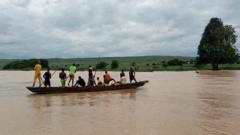What Caused the Deadly Boat Accident in Nigeria?

Published: 2025-09-04 10:45:08 | Category: world
At least 32 people have tragically lost their lives in a boat accident on the River Niger in northern Nigeria's Niger state, highlighting ongoing safety concerns in the region's water travel. The incident, involving an overloaded vessel with approximately 100 passengers, underscores the urgent need for improved safety regulations and enforcement measures.
Last updated: 27 October 2023 (BST)
Key Takeaways
- Over 32 fatalities confirmed after a boat capsized in Niger state.
- More than 50 survivors rescued; search operations for missing individuals continue.
- Government response includes increased regulation of boats and enforcement of life jacket usage.
- Past incidents indicate a pattern of boat accidents due to overloading and inadequate safety measures.
- Local authorities are under pressure to enhance safety protocols for water travel.
Overview of the Incident
The boat tragedy occurred on Wednesday morning when the vessel struck a submerged tree stump in the Borgu area of the River Niger. Abdullahi Baba Ara, spokesman for the National Emergency Management Agency (NEMA), reported that the boat was carrying an estimated 100 passengers, including women and children, far exceeding its safe capacity. Following the incident, authorities confirmed that 31 bodies had been recovered, while eight individuals remain unaccounted for.
Search and Rescue Operations
Search efforts are ongoing, with local authorities and emergency services working tirelessly to locate any missing persons. Ara indicated that more than 50 survivors had been rescued from the river, but the situation remains dire as families await news of their loved ones. The community is deeply affected by the loss, and local district head Sa'adu Inuwa Muhammad expressed his sorrow upon witnessing the recovery efforts, emphasising the need for better safety measures.
Government Response and Regulatory Measures
In response to this devastating incident, the Nigerian government has established a team of "water marshals" tasked with enforcing regulations against overloading and ensuring that all passengers wear life jackets. Ara mentioned that it seems the marshals were not present at the time of the accident, leading to questions about the enforcement of safety protocols.
Previous Boat Accidents
Boat accidents are unfortunately common in Nigeria, primarily attributed to overloading, insufficient regulation, and lack of adherence to safety measures. Just last month, around 25 individuals went missing in a similar incident in Sokoto state, and in December 2022, a tragic capsizing resulted in the recovery of 54 bodies from the River Niger. These recurring events have prompted calls for systemic changes to prevent future tragedies.
Safety Regulations and Initiatives
The Nigerian government has previously mandated that all water travellers must wear life jackets, yet compliance remains inconsistent. This lack of enforcement has been a primary factor contributing to the high rate of boat accidents. In February, the Minister of Marine and Blue Economy, Adegboyega Oyetola, established a "Special Committee on the Prevention of Boat Mishaps in Nigeria" to address these ongoing issues. In May, the ministry announced plans to distribute 42,000 life jackets across 12 riverine states to improve safety standards.
Additionally, the National Inland Water Ways Authority (NIWA) initiated a campaign titled "No Life Jacket, No Travel," along with a "No Night Travelling" mandate in Niger and Kwara states, where accidents are frequent. These initiatives aim to educate the public about the importance of safety gear and responsible travel practices.
The Importance of Water Travel in Niger State
Niger state, the largest by land mass in Nigeria, relies heavily on water travel due to its geographical layout. Many residents depend on boats as a fast and cost-effective means of transportation. However, the lack of safety measures and the prevalence of overloaded vessels pose significant risks to passengers.
Challenges Ahead
Despite the government's efforts to enhance safety, the challenge remains in ensuring that regulations are effectively communicated and enforced. Local authorities and communities must work together to promote awareness about the dangers of overloading and the necessity of wearing life jackets. Without significant changes in behaviour and enforcement practices, further tragedies are likely to occur.
Conclusion
The recent boat accident in Niger state serves as a grim reminder of the urgent need for improved safety measures in Nigeria's water transportation sector. As search operations continue and communities mourn their losses, it is crucial for authorities to take decisive action to prevent future incidents. The implementation of strict regulations and the promotion of safety awareness are vital steps in protecting vulnerable travellers on Nigeria's rivers.
How can Nigeria improve its water travel safety measures to prevent future tragedies? #Nigeria #BoatSafety #WaterTravel
FAQs
What caused the boat to sink in Nigeria's Niger state?
The boat reportedly sank after hitting a submerged tree stump, leading to its capsizing. It was also believed to be overloaded with passengers.
How many people were on the boat during the accident?
The boat was carrying approximately 100 passengers at the time of the accident, significantly exceeding its safe capacity.
What is the response from the Nigerian government regarding boat safety?
The government has set up water marshals to enforce safety regulations, including mandatory life jacket use, and launched campaigns to improve safety awareness.
Have there been other boat accidents in Nigeria recently?
Yes, boat accidents are common in Nigeria. For example, 25 people went missing in a similar incident in Sokoto state last month.
What safety measures are being implemented to prevent future boat accidents?
Initiatives include distributing life jackets, enforcing travel regulations, and conducting public awareness campaigns about the importance of safety gear.



